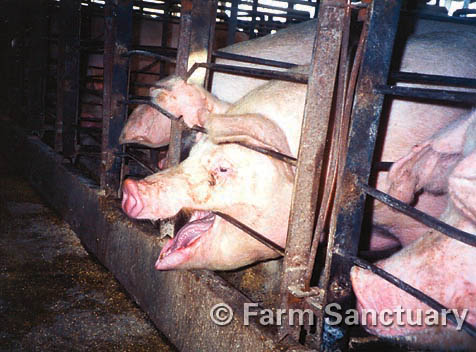Prodded by PETA, Carl’s Jr. Takes First Step Away from Factory Farming
Better Bacon and Happier Hens

Fast-food giant Carl’s Jr., whose parent company CKE is headquartered in Carpinteria, has agreed to improve the quality of life and death for chickens and pigs. The agreement was announced on September 25 by People for the Ethical Treatment of Animals (PETA), which had been in negotiations with CKE since June. The animal welfare organization gained notoriety in the 1980s for its undercover videotaping of abuse in a range of industries, from circuses to furriers to university research.
After years of unreturned phone calls and emails, the group finally got its foot in the door at CKE’s corporate offices by buying $2,000 worth of stock, according to Matt Prescott, PETA’s assistant director of factory farming campaigns. This gave it the privilege of speaking at annual shareholder meetings. But according to CKE public relations manager Jeff Mochal, the company did not cave in to PETA’s implicit threat to upset other shareholders. Rather, the changes in corporate practices reflect CKE’s desire to keep up with the industry at large in responding to consumers’ wishes.
In any case, the steps Carl’s Jr. is taking are nearly identical to those that Burger King agreed to in March after discussions with PETA. Specifically, CKE promised to immediately begin purchasing 15 percent of its pork from suppliers who do not use “gestation crates,” increasing that to 25 percent by July 2008. Prescott described the crates as metal enclosures too small for the pigs to turn around or lie down in comfortably. CKE also agreed that by next July it will purchase two percent of its eggs from poultry farms where hens are not confined to wire cages. Such cages “don’t even afford them enough space to spread a wing,” according to Prescott.
CKE had previously agreed in 2006 to notify poultry suppliers that the company will “consider purchasing” products from those who “actively explore and test” controlled-atmosphere killing, a method that removes oxygen from the air while birds are still in their transfer crates. This year, CKE ironed out details of that commitment. PETA considers controlled-atmosphere killing more humane than the industry standard, which involves shackling the chickens, immobilizing them with electrical shocks, and cutting their throats. The controlled-atmosphere process is supposedly cleaner, surer, and also kinder to factory workers who now struggle to shackle the birds while they are alive and kicking. According to Prescott, the June 2006 shareholders’ meeting was already underway when he got word that CKE had agreed to send the notification to suppliers, so he cancelled his plans to embarrass the board. (Although shareholders get to speak for only three minutes, Prescott said, “We have a great way of packing in a lot of graphic information into a short statement.”)
“To the extent that PETA now won’t have to show up at a shareholders’ meeting,” said Mochal of CKE, “that’s fine, but I wouldn’t say that weighed heavily on our minds when we made this decision.” The company had heard what Burger King was doing, he said, and simply didn’t want to fall behind the curve. “Everybody thinks [the things we are doing] are earth-shattering, but if you look at the agreement-something like two percent of eggs from cage-free hens starting next year? PETA would want 100 percent, so the idea that we are doing everything that PETA wanted is a little off-base.” Mochal explained, “They don’t show up and throw blood on you or anything. A couple of their people just come and say what they think is going on in the industry, and they are knowledgeable because they have had meetings with suppliers and competitors.”
Because CKE deals in such quantity, its suppliers include chicken farms that have 100,000 laying hens, which is one reason that tiny wire cages are the industry standard, and the reason CKE did not agree to getting more than two percent of its eggs from cage-free hens. As for controlled-atmosphere killing, Mochal said it would be very expensive for suppliers to retrofit their operations for that technology. But he did note that the move by Carl’s Jr. will likely help PETA urge suppliers to switch to that method.
CKE also owns the Green Burrito, Red Burrito, and Hardee’s restaurant chains, but the animal welfare agreement applies only to Carl’s Jr. and Hardee’s. PETA owns stock in some 42 corporations that produce or supply animal products, according to Prescott. It does not have agreements with all of them. However, McDonald’s restaurants-whose Egg McMuffin was invented in Santa Barbara by franchise manager Herb Peterson-agreed to produce a full report, released in 2005, on controlled-atmosphere killing. In addition, Safeway formed an animal welfare council and Starbucks agreed to broach humane treatment issues with its suppliers



